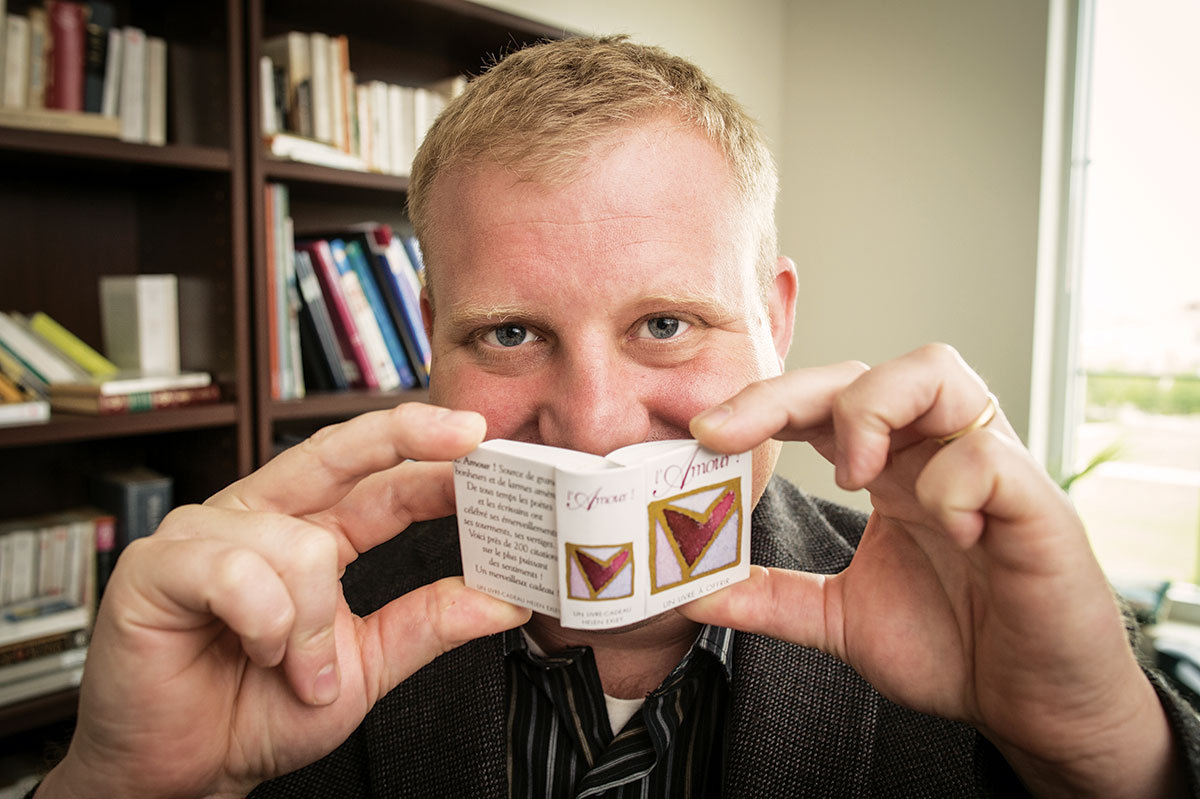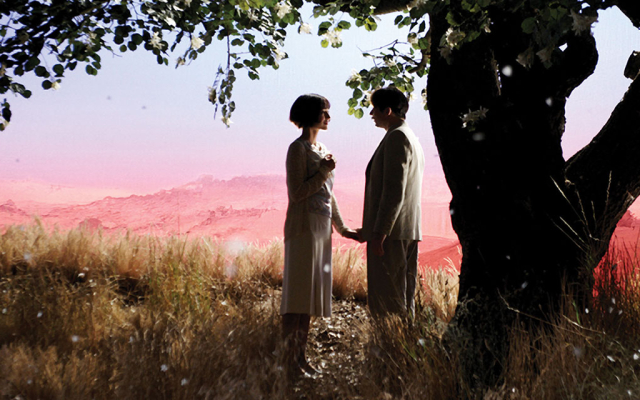Pardon my French
Modern Languages professor Joshua Blaylock links TCU with elite festival of films for academic discourse.

Modern Languages professor Joshua Blaylock secured a one-year renewable grant from the French-American Cultural Exchange Foundation for TCU to be one of 60 universities to host this year’s Tournées French Film Festival. (Photo by Leo Wesson)
Pardon my French
Modern Languages professor Joshua Blaylock links TCU with elite festival of films for academic discourse.
Even though Dr. Joshua Blaylock is in his first year teaching at TCU, it hasn’t stopped him from finding new ways for students to engage with French.
As one of only 60 universities in the U.S. to participate in this year’s Tournées French Film Festival, TCU drew nearly 90 people on the first night. About half were from the greater Fort Worth community, said Blaylock, an assistant professor of French.
“French cinema is the second largest cinema in the world and there’s a reason for that,” said Blaylock. “It appeals to a broader audience than just people who speak French.”
Blaylock secured a one-year renewable grant from the French-American Cultural Exchange Foundation to host the festival. Working with the French consulate in Houston, the foundation develops events to connect people who share a love of French culture, regardless of their native language.
The professor was inspired to apply for the grant after attending a campus film festival as a graduate student at Brown University. “You got a lot of exposure to new, contemporary films that you wouldn’t see otherwise,” he said.
At Brown, Blaylock specialized in French Renaissance literature, but the visual arts have always been one of his interests. During the Renaissance, the professor explained, visual culture became a fundamental part of how philosophers and artists reimagined the world around them.
Today, Blaylock said, vision is still emphasized heavily in society. “We have a very strong visual identification.”
After receiving the foundation grant, Blaylock had a dilemma: Which films would best fit TCU? With more than 90 French-language films in the festival’s catalog, each campus screens only six of them.
Blaylock chose films that showcased the range of genres within French cinema. “I wanted to show films, both at TCU and to the general public, that would represent the variety of French language films that are out there.”
To kick off the festival, Blaylock chose Ernest et Célestine (2014), an animated feature that tells the story of a bear and a mouse that become unlikely friends.
The 2014 film was selected to open the festival based on its relevance to current events. Referencing the terrorist attacks that took place in Paris in January, Blaylock said the timeliness of the film that talks about “crossing boundaries and developing understanding.”
Grigris (2012), the second film, was a direct contrast. A drama, it was filmed and set in French-speaking Chad in Central Africa and follows the story of a young man with a paralyzed leg who pursues his passion for dancing.
Blaylock chose Grigris for its insight into a Francophone country outside of France and portrayal of poverty and daily struggles of life in Chad. “Each film, in some ways, is taking people out of their own cultural context,” he said.
The only classic film was Mauvais Sang (1986), which features a young Juliette Binoche and a rocking David Bowie soundtrack, making it both edgy and timeless. Set in the near (dystopian) future, the festival’s third film told a story of crime, drama and romance.
Quai d’Orsay (2013), the fourth film, was a comedic look at politics from the perspective of a politician’s speechwriter. The film’s genre was an important factor for Blaylock. “Political satire is a huge part of French culture,” he said.
The festival’s fifth film taps into a different element of French culture: star cinema. Elle s’en va (2013) headliner Catherine Deneuve has been one France’s most prominent and legendary actresses since the 1960s. Elle s’en va features Deneuve in a film that is both comedic and dramatic as it tells the story of a spirited woman who learns to connect with her grandson on their road trip across France.
With the help of the Virtual Voyages component of the Discovering Global Citizenship program at TCU, Blaylock arranged a Skype session with Emmanuelle Bercot, the director of Elle s’en va. The professor served as French interpreter for Bercot, who talked with the campus audience from her apartment in Paris.
Blaylock closed the festival with Poulet aux prunes (2011), a whimsical and stylized comedy, as a testament to co-director Marjane Satrapi’s resonance within the campus community. Satrapi, the film’s co-director, visited the TCU campus in the fall semester. (She co-directed the movie, Persepolis (2007), which was adapted from a book of the same name. The novel was the core reading for many TCU French classes this academic year.)
Blaylock’s classes devoted a two-week unit to French cinema, and the professor encouraged students to attend several screenings at the festival. Students in lower-division French classes discussed a film during their oral exams, while upper-division French composition classes wrote reviews about a film at the festival.
Some students learned that the films revealed parts of French culture that they had not known about beforehand.
Brooke Honcharik, a senior theater major, said the films gave her a new perspective on the global nature of the film industry.
“It made me realize there are multiple ways to tell a story,” she said. “I’m not confined to the cookie cutter Hollywood structure.”
Lauren Hart, a senior in Blaylock’s Intro to Composition class, described the movies as “eye-opening.” She said the festival films exposed students to aspects of French culture that may not have been emphasized in a regular, standardized language course.
The contrasts between French and American cinema were among the student reactions Blaylock hoped to achieve when he applied for the festival grant. He wanted festival participants, especially students, to step outside of their visual comfort zone.
“That’s when you become a critical thinker,” the professor said. “In that moment, you’re expanding your awareness of what’s out there.”







Your comments are welcome
Comments
Related Reading:
Campus News: Alma Matters
From Application to Admission
Amid an increasingly selective admission process, Heath Einstein leads the team that builds the TCU community of the future.
Campus News: Alma Matters
From the Chancellor
Chancellor Victor J. Boschini, Jr., identifies what made TCU and its sesquicentennial so memorable.